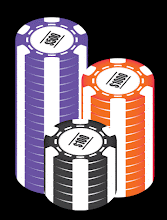Every time a poker player sits down to play the cash game, whether it is in a Las Vegas casino, at home, or at an online poker room, a decision must be made on how much money or chips they want to bring to the table. Most card rooms will have a minimum buy-in amount, and certain games might have a maximum. When players decide to purchase the minimum, or only a small amount of chips (nicknamed 'short stacks'), it is considered to be an indication of weakness and a 'tell' on the players ability or recent fortune.
Players that start the game with a short chip stack are often considered by the others to be scared of losing, and consequently must play cards with a poor poker strategy. It has been observed that players not expecting to win often use a short-buy to limit their losses on playing mistakes, while good players maximize their potential wins by having a big stack at the table. The 'short stack' image of weakness holds true much more at no-limit games over other forms of poker.
Strategically, aggressive betting, semi-bluffing and blind stealing is usually considered correct strategy at no-limit games, and short stacks simply don't have the ammunition to make those bigger bets needed. Big stacks can make the occasional bluff with the confidence of staying in action if it goes wrong, and can use their calling ability to deter small stacks from risking a bluff against them. Using a big pile of chips as a psychological tool to induce or prevents bets from weaker opponents can be a very successful strategy when done properly, and good players will immediately recognize anyone not able to do the same as a potential target.
Your own mind-set should be considered when purchasing chips at a table as well. For example, a player that buys-in for $20, loses it, re-buys for $20, loses again and put another $20 on the table, will likely be in a much worse position mentally then a player that simply started with $140 and now has $100 on the table. These sense of losing multiple times will put players on tilt and make them lose focus much more than being down on chips 'temporarily'.
Occasionally short stack players are actually good players that are broke for reasons outside of the game, and other times a short stack that is seen may not have necessarily started that way earlier in the day. Although these incidents aren't an indication of the players' ability, it may at least be a tell on their current state of mind. A player facing problems away from the game never seems to play their best poker and players on a bad run, no matter how good they can be, often go on tilt and play differently or poorly when losing.
The 'short stack' tell is one of the few behavioral tells that seems to hold true online as well as in real life, however it seems to have more accuracy in actual brick and mortar casinos. Winning players should be looking to exploit any players presenting this remarkably reliable tell, mostly by raising and betting aggressively against these shorter stacks. It is important to avoid this situation yourself by consistently sitting down with one of the larger stacks at the table and remaining adequately funded for any poker game you play.
Again, that is just one of MANY small tells that experience players use. To learn about this and many other tips, you need to check this out --> Click here!
Short Stacks in Poker
Labels:
deep stack,
poker,
short stack,
texas holdem
Subscribe to:
Post Comments (Atom)

0 comments:
Post a Comment